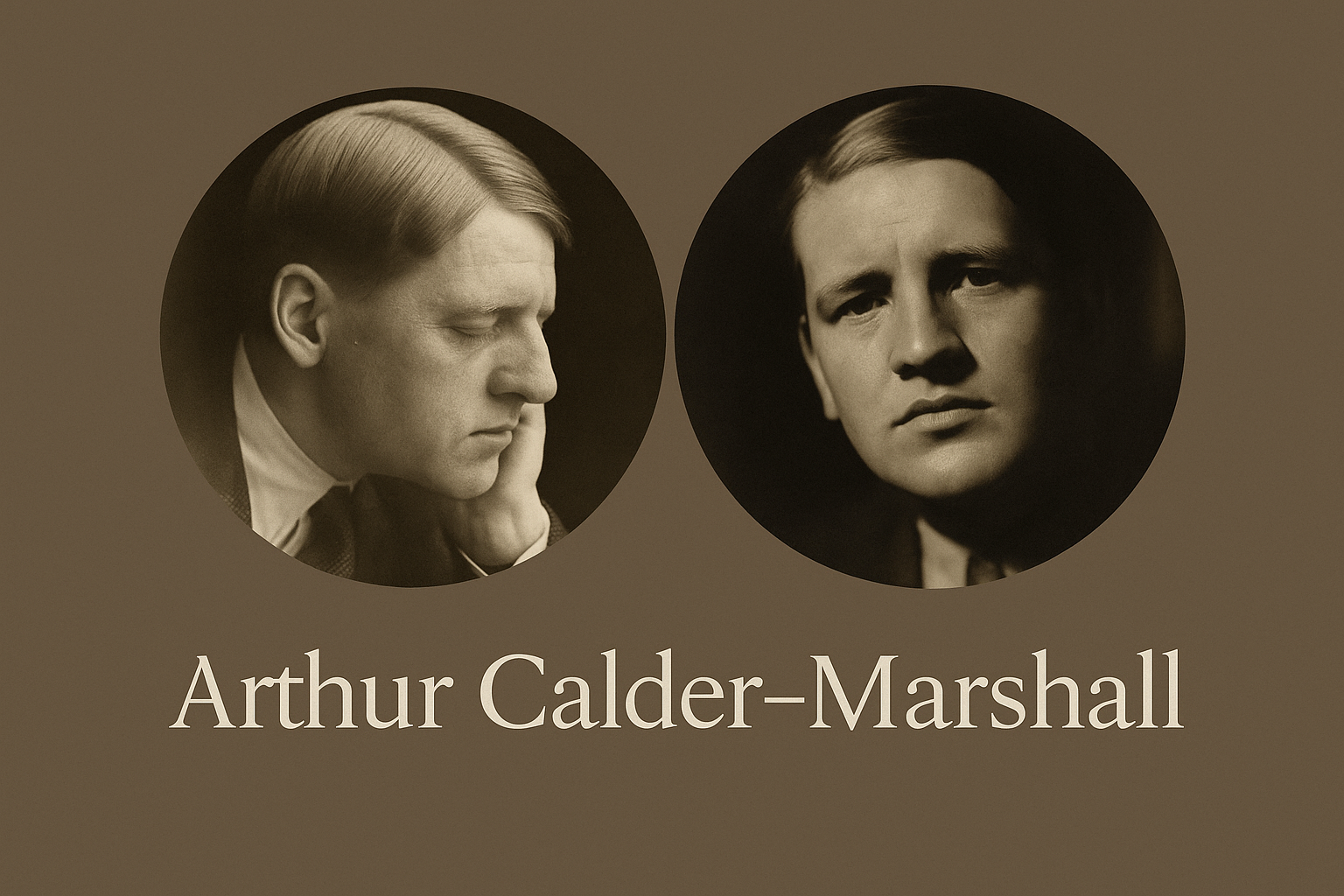Arthur Calder Marshall: The Brilliant Forgotten Voice of 20th Century British Literature
Unveiling the life, legacy, and literary mastery of an underrated novelist and cultural commentator

Introduction
Arthur Calder Marshall was a prolific and masterful English writer whose works spanned fiction, non-fiction, biography, children’s literature, and critical essays. Though never achieving widespread fame during his lifetime, his deeply human characters, moral depth, and stylistic variety left an undeniable mark on 20th-century British literature. From Pie in the Sky to The Magic of My Youth, Calder‑Marshall tackled political ideologies, psychological struggles, and social commentary with unmatched originality. Today, critics are rediscovering his works and recognizing his overdue literary importance.
This article explores his early life, education, family, career achievements, and enduring influence, aiming to restore Arthur Calder Marshall to his rightful place in the pantheon of great British authors.
Quick Bio
| Key Detail | Information |
|---|---|
| Full Name | Arthur Calder‑Marshall |
| Date of Birth | 19 August 1908 |
| Birthplace | Wallington, Surrey, England |
| Nationality | British |
| Education | Hertford College, Oxford |
| Spouse | Ara Calder‑Marshall (née Violet Sales) |
| Children | Anna Calder‑Marshall |
| Famous For | Novels, biographies, essays, children’s books |
| Notable Works | Pie in the Sky, The Fair to Middling |
| Died | 17 April 1992 |
Arthur Calder‑Marshall was born on 19 August 1908 in Wallington, Surrey, England. He came from a family with Scottish Episcopalian roots on his father’s side, linked to goldsmiths and merchants. His father, Arthur Grotjan Marshall, later adopted the double-barrelled name Calder‑Marshall, and worked as a civil engineer. His mother, Alice Poole, played a significant role in his upbringing, fostering a love for literature and language.
As a child, Arthur spent much of his youth in Sussex and developed early friendships with figures such as Victor Neuberg. These experiences later became part of his autobiographical work The Magic of My Youth, a window into the mystical and intellectual circles he encountered during his formative years.
Education and Intellectual Formation
Calder‑Marshall attended Hertford College, Oxford, where he immersed himself in a lively literary environment. Surrounded by peers like Stephen Spender and Isaiah Berlin, he developed a sophisticated understanding of literature, politics, and social critique. While at Oxford, he contributed to the university magazine The Outlook, showcasing early signs of his analytical voice and narrative complexity.
These university years not only shaped his ideological leanings but also prepared him for a writing career that spanned genres. His exposure to literary giants and radical thinkers led to an early association with the Communist Party of Great Britain, which influenced his writing themes, especially in the 1930s.
Marriage, Family, and Personal Life
Arthur Calder Marshall married Violet Nancy Sales, known professionally as Ara Calder‑Marshall, a documentary screenplay writer. The couple had one daughter, Anna Calder‑Marshall, who went on to become a successful actress. Arthur’s grandson, Tom Burke, is also a prominent actor, showing that creativity and storytelling ran in the family.
Despite his professional commitments, Arthur maintained a rich and intellectually stimulating home environment. His marriage was both a creative and emotional partnership, with shared interest in writing and the arts playing a central role in their lives.
Start of Career and Political Views
Calder‑Marshall began his professional life teaching English at Denstone College in Staffordshire from 1931 to 1933. The experience was not a happy one, but it served as material for his first notable novel, Dead Centre, which offered a critical look at institutional life and personal isolation.
He was politically engaged in the early 1930s and briefly affiliated with the Communist Party. However, his beliefs evolved over time, shifting toward Christian Socialist ideals. This ideological fluidity is evident in his fiction, which often explored human morality, societal hypocrisy, and inner conflict rather than rigid dogma.
Literary Breakthrough and Major Works
Arthur Calder‑Marshall’s literary career took off with Two of a Kind and About Levy in 1933. But it was Pie in the Sky (1937) that marked his literary breakthrough. The novel presented a complex portrait of working-class life and ideological confusion during the interwar period.
Another major success came with The Way to Santiago (1940), a political allegory with rich imagery and moral depth. A Man Reprieved (1949) and Occasion of Glory (1955) followed, both showcasing his skill at psychological fiction and narrative structure. These works were even considered for film adaptations by figures like Orson Welles and James Mason, though the projects were never completed.
Children’s Books and Social Commentary
Arthur Calder Marshall did not restrict himself to adult fiction. He authored several notable children’s books, including The Man from Devil’s Island and The Fair to Middling. The latter is particularly significant for its treatment of disability, class, and morality. It has since been recognized as one of the most progressive works in mid-20th century children’s literature.
In parallel, he published essays and cultural critiques like Wish You Were Here and Lewd, Blasphemous and Obscene, examining issues from Victorian obscenity laws to popular visual culture.
Biographies, Memoirs, and Editorial Work
In addition to his fiction, Calder‑Marshall wrote important biographies on figures such as Havelock Ellis, Robert Flaherty, and Joseph Leycester Lyne. His memoir The Magic of My Youth remains one of his most personal and evocative works, filled with memories of youthful curiosity, mysticism, and early encounters with intellectual heavyweights.
He also served as an editor for works by Jack London, George R. Sims, and Thomas Paine. His ability to adapt across genres—fiction, biography, memoir, and editing—makes him a uniquely versatile figure in literary history.
Latest News and Literary Legacy
Arthur Calder‑Marshall passed away on 17 April 1992. Although he faded from mainstream recognition, a 2020 Guardian article sparked renewed interest in his career, especially his connection with unrealized film projects. His daughter is said to possess an unpublished memoir, described as darkly humorous and deeply moving.
Today, critics and scholars are revisiting his work for its psychological depth, literary innovation, and fearless engagement with social themes. He is increasingly viewed as a major yet underappreciated figure in 20th-century British literature.
Conclusion
Arthur Calder‑Marshall was a literary force whose work defied classification and convention. Whether through his politically charged fiction, compassionate children’s stories, or reflective memoirs, he consistently challenged societal norms and illuminated the complexities of human experience. His legacy, long overlooked, is now experiencing a well-deserved resurgence. As more readers and critics rediscover his contributions, Arthur Calder‑Marshall’s name is once again being recognized as a powerful voice in British literature.
Frequently Asked Questions (FAQ)
Who was Arthur Calder‑Marshall?
Arthur Calder‑Marshall was a British novelist, biographer, essayist, and children’s author known for his wide-ranging literary works and moral depth.
What is Arthur Calder Marshall best known for?
He is best known for Pie in the Sky, The Fair to Middling, and The Magic of My Youth, as well as biographies and cultural essays.
Did Arthur Calder Marshall have any famous relatives?
Yes, his daughter Anna Calder‑Marshall is an actress, and his grandson Tom Burke is a well-known actor.
Was any of his work adapted into films?
Several of his novels were optioned by famous filmmakers like Orson Welles and James Mason, but none made it to screen.
What is Arthur Calder Marshall’s legacy?
His legacy lies in his literary versatility and courage to tackle psychological, political, and social complexities with honesty and creativity.



